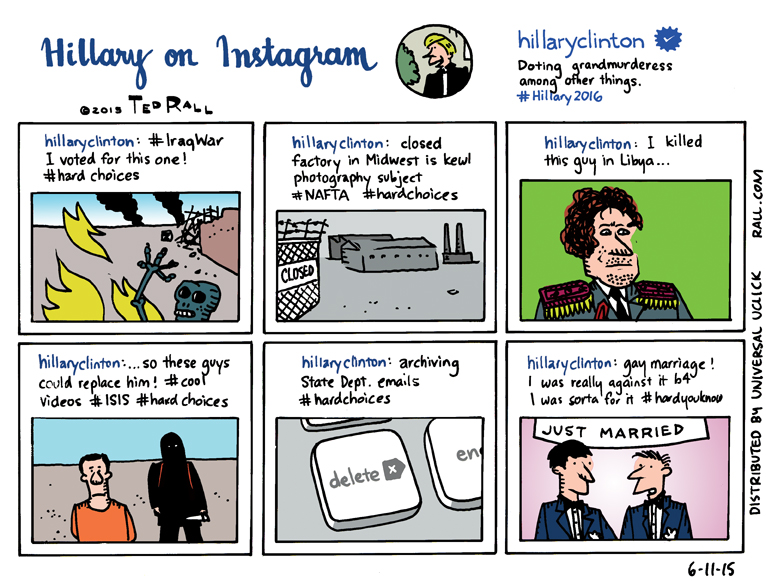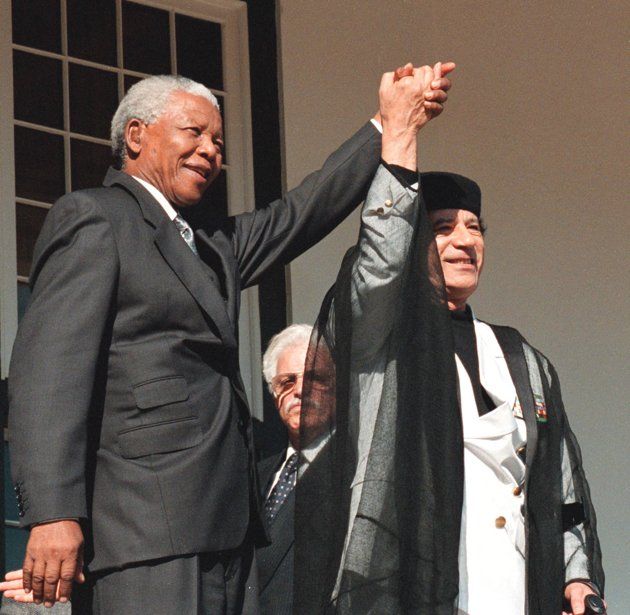Originally published by SkewedNews.net:
 Donald Trump has surged to the top of the Republican heap by saying outrageous things, issuing over-the-top insults, and making ridiculous proposals. Some of his utterances, like his sexist remarks about Carly Fiorina’s looks, are offensive. His nativist demagoguery, calling for mass arrests and deportations of Latinos and a visa ban to Muslim visitors, are outright fascist.
Donald Trump has surged to the top of the Republican heap by saying outrageous things, issuing over-the-top insults, and making ridiculous proposals. Some of his utterances, like his sexist remarks about Carly Fiorina’s looks, are offensive. His nativist demagoguery, calling for mass arrests and deportations of Latinos and a visa ban to Muslim visitors, are outright fascist.
Trump also says stuff that other politicians, and the media are afraid to say and need to be said. Here is a sample of the top six.
- Invading Iraq was stupid. The pundits say San Bernadino changed everything, at least the race for the Republican nomination, replacing pocketbook issues with foreign policy and terrorism as voters’ main concerns. If that’s true, if hawkishness is king, then why is the GOP frontrunner doing well despite his consistent opposition to invading Iraq — the most significant Republican-led foreign policy initiative of the last 30 years? “Right now we have ISIS, which is worse than Hussein. Hussein did one thing: he killed terrorists,” Trump said in May. “We are in worse shape than we ever were. It’s a mess.” Most American people agree — but even Democrats don’t come down as hard on Bush’s Iraq War as Trump. (Maybe that’s cuz Hillary voted for it and Bernie, supposedly the wild socialist of the campaign, voted to fund it.) Everything else aside, Trump deserves points for hammering away at this.
- Interventionism in the Middle East is stupid. Bernie Sanders criticizes America’s penchant for “regime change,” but Trump uses a sledgehammer where Sanders is content with calm analysis. Trump is also more willing to say that a secular socialist dictator beats the after-me-the-deluge play-it-by-ear approach we’ve seen lately, creating power vacuums filled by radical Islamists. “She is the one that caused all this problem with her stupid policies,” Trump said December 13, referring to Hillary’s tenure as secretary of state. “You look at what she did with Libya [assassinating Moammar Khaddafi and funding Benghazi-based rebels, including many radicals], what she did with Syria [supporting the Free Syrian Army, parts of which became ISIS]. Look at Egypt, what happened with Egypt, a total mess. [The Obama Administration secretly supported the overthrow of Hosni Mubarak, then yielded to buyer’s remorse and backed the military coup that overthrew Mohamed Morsi, the nation’s first democratically elected president.] They don’t back — we don’t back any of our allies. You look, she was truly, if not ‘the,’ one of the worst secretary of states in the history of the country. She talks about me being dangerous. She’s killed hundreds of thousands of people with her stupidity.” “What do you mean, hundreds of thousands?” a TV host asked, clearly shocked at his candor. “She was secretary of state. Obama was president, the team,” Trump replied. “Two real geniuses.” Trump has it right — dead right.
- Good relations with Russia would be a good thing. Reading and watching corporate media, you could easily forget that the Berlin Wall ever came down or that the Cold War ever ended. Never mind that post-Soviet Russia has never directly confronted the United States in its sphere of influence. To his credit, sees the wisdom of not picking fights with a nation with the world’s largest stockpile of nuclear weapons, a colossus that spans nine time zones and possesses vast natural resources. “I believe I’ll get along fine with [Russian President Vladimir] Putin,” Trump reiterated “I believe I’ll get along fine with other leaders. Obama doesn’t get along with Putin. Putin can’t stand our president and it’s causing us difficulty. And, frankly, and I said it a long time ago, if Russia wants to bomb the hell out of ISIS and join us in that effort, I am absolutely fine with it. I think that’s an asset, not a liability.”
- Electoral politics in America are corrupt. “I will tell you that our system is broken,” Trump said during one of the debates. “I give to many people. I give to everybody, when they call I give, and you know what? When I need something from them, two years, three years later, I call, they are there for me.” No one else, certainly not Hillary or his rival GOP contenders who are on the take, has the credibility of a guy who can personally attest to using his billions to buy Congressmen and Senators.
- We need more legal immigration. As noted above, immigration policy is where Trumpism goes off the rails. Even so, Trump makes one reasonable point: we need less illegal immigration and — this next parts gets lost a lot in the furor over his calls for magical walls he’ll somehow get Mexico to pay for — more legal immigration. “Build a wall with a big beautiful door for legal immigration,” Trump said. Granted, he has flipflopped on the issue. But increasing legal immigration is still a conversation we need to be having — even though a lot of the new arrivals ought to be (sorry, Donald) Muslim refugees from places we screwed up, like Syria.
- Common Core sucks. Like many of Trump’s stances, he’s on the right side of Common Core for the wrong reasons — he doesn’t like federal control of education. (Frankly, all the countries the U.S. is falling behind have centralized educational curricula.) But the Common Core standards enacted by the Obama Administration really have been a “disaster,” as Trump says. “I believe Common Core is a very bad thing,” he says. Last year, most students failed the way-too-difficult test in 49 states, destroying confidence and self-esteem among millions of American children. Meanwhile, teachers — who can be fired if their kids don’t do well — are spending scores of hours teaching to this stupid test as opposed to, you know, teaching actual knowledge. You won’t get this straight talk on Common Core from Hillary Clinton, or even Bernie Sanders.
For Skewed News, I’m Ted Rall.









